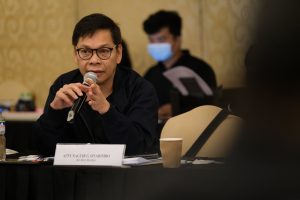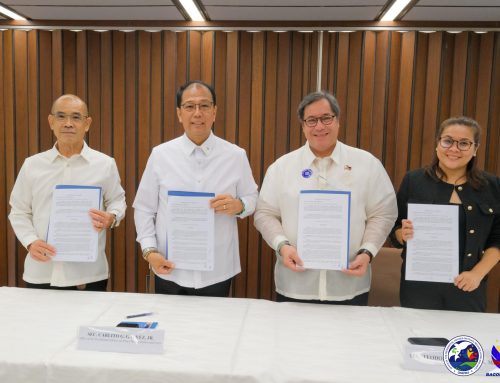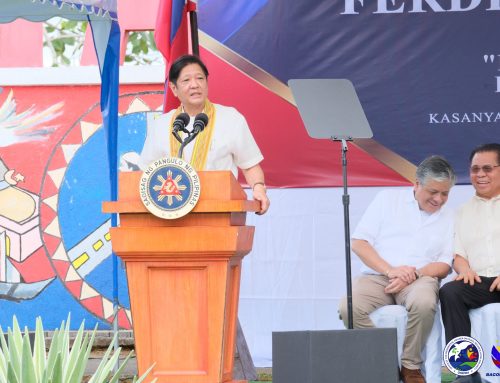MANILA — The Government of the Philippines (GPH) and Moro Islamic Liberation Front (MILF) inked a statement of commitment signifying the parties’ full support for the continued implementation of peacebuilding and development interventions under the Normalization Program of the Comprehensive Agreement on the Bangsamoro (CAB).
The statement was signed by Joint Normalization Committee (JNC) co-chairs Ariel Hernandez and Eduard Guerra, for the national government and MILF sides, respectively, during the 5th JNC meeting on Friday, June 24.
“The JNC shall ensure full implementation of the Normalization Program as stated in the CAB relative to its mandate to coordinate and facilitate all normalization efforts, such as the redeployment of AFP, disbandment of private armed groups, management of small arms and light weapons, policing and the decommissioning,” the joint statement read.
“…with goodwill and understanding among our leaders, as well as stakeholders, the implementation of the agreed programs can move forward for all to reap the fruits of the social, economic, security, and political reforms and measures stipulated in the CAB,” the statement noted.
“The JNC believes that the path to peace and the continued implementation of the CAB and BOL remain the only viable solution in achieving just and lasting peace in the Bangsamoro communities,” the statement added.
A ‘complex’ process
According to Hernandez, implementing the CAB is a “complex process.” The creation of the JNC, he pointed out, enabled the GPH and MILF Peace Implementing panels to overcome such complexity and move forward the normalization track of the peace agreement.
“I would like to note that however complex the implementation of the peace agreement, the JNC is an integral mechanism to make it happen,” he said, noting that the key has been the strong partnership and high level of trust developed between both peace panels.
 “The complexity can easily be handled and managed if we have partners with us on the ground. Not just with the National and Bangsamoro governments but also from the local and international NGOs,” Hernandez stressed.
“The complexity can easily be handled and managed if we have partners with us on the ground. Not just with the National and Bangsamoro governments but also from the local and international NGOs,” Hernandez stressed.
For his part, Guerra said he is optimistic the incoming administration will sustain the gains of peace in the Bangsamoro Autonomous Region in Muslim Mindanao (BARMM).
“We hope that the next administration will embark on the same atmosphere of partnership and cooperation. Pinakaimportante po ang relationship sa bawat isa,” he said.
Joint GPH-MILF initiatives
Contained in the JNC statement are specific peacebuilding initiatives the GPH and MILF peace panels have agreed to carry out.
These include the proposed flow and criteria for a joint security assessment for the redeployment of Armed Forces of the Philippines (AFP) units assigned in the BARMM and its adjacent regions.
The peace panels have also developed the proposed framework of a program that will be implemented in MILF communities outside the six previously government-acknowledged MILF camps.
The program was formulated by technical working groups led by the JNC, the United Nations Development Programme (UNDP) and the Task Force for Decommissioned Combatants and their Communities (TFDCC).
The JNC will lead the implementation of the program, in collaboration with the UNDP, TFDCC, and other relevant Normalization mechanisms.
The joint statement also included the proposed framework for a program on management of Small Arms and Light Weapons (SALWs) that will be part of the Community Security and Stabilization Program (C2SP).
This C2SP will cover all firearms owned by individuals in MILF communities, except those weapons that are set for decommissioning.
The program was formulated through a series of technical working group meetings spearheaded by the JNC and the UNDP, in partnership with the Joint Peace and Security Committee (JPSC) and other Normalization mechanisms.
Also mentioned in the joint agreement is the JNC’s request for the Fondation Suisse de Déminage (FSD) to conduct a workshop in July 2022 be participated in by representatives from the GPH and MILF implementing panels, JNC, JPSC, and other ceasefire mechanisms.
The workshop seeks to align the work of the FDS-PCBL to the deliverables of the Normalization Program. A framework on how to integrate the FSD initiatives in the Normalization program shall be presented in the next JNC meeting.
The JNC, through the statement, likewise requested the Catholic Relief Services (CRS) and Kroc Institute for International Peace Studies to provide technical support in enhancing the Normalization Monitoring and Evaluation System being used by the JNC.
The JPSC conveyed its gratitude to the Nonviolent Peaceforce (NP) Philippines, and the European Union in the Philippines, for the continuing support to the Joint Peace and Security Teams (JPSTs), while the JNC requested the Nonviolent Peaceforce (NP) Philippines to broaden its support to ensure sustainability of its interventions, as well as the continuing deployment and operations of the JPSTs.
In the statement, the JNC also acknowledged the crucial role played by its international and local peace and development partners in the implementation of the Normalization program, which include the European Union in the Philippines, United Nations Development Programme (UNDP), Nonviolent Peaceforce (NP) Philippines, Australian Embassy – Department of Foreign Affairs and Trade; embassies of Japan and Norway, Initiative for Dialogue and Empowerment through Alternative Legal Services (IDEALS), The Asia Foundation (TAF), Japan International Cooperation Agency (JICA), Fondation Suisse De Déminage (FSD), Centre for Humanitarian Dialogue (CHD), Catholic Relief Services (CRS), and Kroc Institute for International Peace Studies.
Peace and security updates
During the JNC meeting, the body approved the proposed framework program for the MILF communities outside the six government-acknowledged MILF camps and the Community, Security, and Stabilization Program under the UNDP.
The pilot areas include the MILF 103 Base command in Maguing, Lanao del Sur; 113 Base Command in Tungawan, Zambo Sibugay; 108 Base Command in Al Barka, Basilan; 108 Base Commend in General Salipada K. Pendatun, Maguindanao; and the 109 Base Command in Datu Paglas, Maguindanao.
The JPSC also presented the body’s 2021-2022 accomplishments, as it highlighted the collection and safeguarding of collected firearms and ammunitions during the third phase of decommissioning.
The JNC reported that the Task Force on the Disbandment of Private Armed Groups has disbanded 15 PAGs with 94 members, and recovered 86 firearms.
Under the SALW program, 290 weapons were turned-in in Basilan, 218 in Tawi-Tawi, and 173 in Maguindanao. Individuals who turned in their firearms were given livelihood assistance.
The SALW, which is under the security component of the normalization track of the CAB, aims to restrict the movement and manage the number of loose firearms in Bangsamoro communities.
The program on DPAGs, on the other hand, seeks to address pressing peace and security concerns in the Bangsamoro and its adjacent regions, particularly those caused by private armed groups.
Also discussed during the meeting were the redeployment of AFP, the status of the JPST, as well as the clearing of UXO and landmines.
An ‘irreversible’ stage
In his closing message, BARMM Interior and Local Government Min. Naguib Sinarimbo, who is also a member of the JNC MILF, said that although much has been achieved under the Normalization Program, there is still a lot of work to be done in the areas of peace, security and development.
“It is important to remember that at the current stage, we’ve already reached an irreversible stage, and we’ve set an irreversible course towards peace, security, and development in the Bangsamoro. There is no turning back. We are at the point where the only way is to move forward the peace process,” Sinarimbo said.
For his part, Usec. David Diciano, chairman of the Government Peace Implementing Panel, expressed his gratitude to all those who contributed to the successful implementation of the Normalization Program.
“On behalf of the GPH, our grateful appreciation to our partners to our partners from the JNC MILF, our joint secretariat, partner agencies and development partners both local and international. Dahil sa pagsama-sama natin at strong partnership napapadali ang ating mga trabaho.” Usec. Diciano said.
Presidential Adviser on Peace, Reconciliation and Unity Sec. Carlito G. Galvez, highlighted the strong partnership between the GPH and MILF peace panels.
“Through the jointness shown by the GPH and MILF peace panels, we have been able to successfully implement peacebuilding and development initiatives under the normalization track of the CAB, which are now making an impact in the lives of the Bangsamoro people,” Galvez said.
“It is our hope that through the JNC, the incoming administration will push forward, build on, and sustain the gains we have achieved under the Bangsamoro peace process,” he added.
The JNC meeting held on Friday is the last meeting to be held by the body under the Duterte administration. ###











